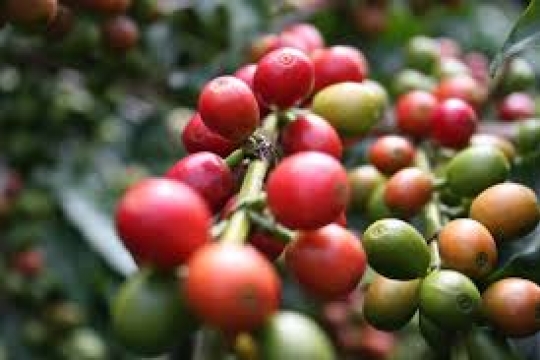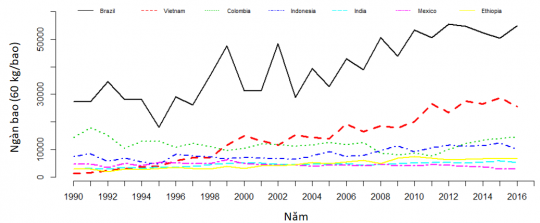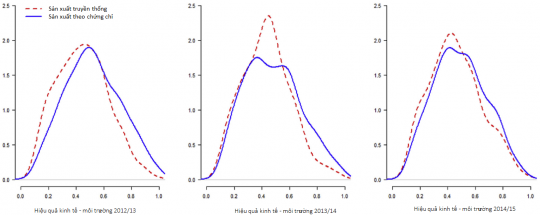We often believe that certification of sustainable coffee production could help in enhancing economic benefits to farmers and reducing negative impacts on the environment. However, empirical research conducted worldwide has no clear evidence supporting this belief. In addition, there is a lack of empirical evidence of economic and environmental analysis in coffee production for Vietnam – the world’s second largest coffee producing country. The added value is often accompanied by environmental pressures in coffee production. Environmental pressures include consumption of nitrogen, phosphorus, irrigation water, pesticides, herbicides, fungicides and land use. The empirical evidence of coffee production in Vietnam indicates that about 50% of environmental pressures could be reduced while maintaining the current value-added level. On average, sustainability certified farms are found to be more eco-efficient than conventional farms, but eco-efficiency differences appear to converge over time. This convergence may be due to the positive spill-over effects of certification, less compliance to certification standards of certified farms, or the combination of these effects. Farms with higher elevation, having windbreak trees, and using drip or spray irrigation systems are more eco-efficient. These factors should be considered when designing policies for sustainable coffee production, rather than focusing solely on rapid expansion of certified production.
Environmental and economic risks of Vietnam’s coffee production
Since the late 1990s, Vietnam’s coffee industry has attained many great achievements. Vietnam surpassed several well-know coffee producing countries, such as Columbia and Indonesia, to become the world’s second largest country after Brazil. This trend has been firmly observed in recent years.
Figure 1. Coffee production of major coffee producing countries
However, besides the achievements, Vietnam’s coffee industry has faced many serious environmental challenges. Previous studies indicated that coffee production in Vietnam is unstainable: overuse of chemical fertilizers, or inefficient use of groundwater could cause many economic and environmental burdens. Several negative consequences have been warned and observed. These include land infertility and the degradation of water resources. If this situation continues, one may doubt about the future of Vietnam’s coffee industry. Whether the industry can maintain the growth and reach sustainable goals in terms of both economic and environmental aspects. The future economic benefits of coffee farmers will be seriously affected by today’s unstainable farming practices.
Sustainability certification: a marketing tool or sustainability strategy?
Several studies found that coffee consumers are aware of the important role of environmental issues associated with coffee production. They are also willing to pay higher for improving the environment. Consumers from major coffee markets like the US and Germany are willing to pay more for certified coffee products, i.e., Fairtrade certification scheme. We expect coffee growers are the one who should receive higher prices for participating in environmental sustainability certification programs. That is, the economic benefits of certified coffee production will be clear and large enough to motivate farmers improving ecological environment in coffee production.
However, the fact that the economic benefits of certified coffee production is unclear. Some studies indicated higher profits of certified production due to the price premium, but several studies concluded that there are no economic benefits. Consumer pay higher, but certified coffee farmers do not achieve economic benefits or very low economic benefits. So, the question is that the benefits of participating in sustainability certification schemes that consumers are willing to pay, who will benefit – if not coffee farmers. The incentive for intermediaries to persuade farmers to participate in sustainability certification is for the benefit of stakeholder, improving the environment or merely a marketing tool of the intermediaries.
Based on the preferences of coffee consumers and the unstainable coffee farming practices, participation in sustainability certification schemes is considered as a strategic option for Vietnam’s coffee industry. In recent decades, many certification schemes have been introduced and these have attracted attention of many stakeholders. Common certification schemes applied in Vietnam includes Utz-Certified, 4C (the Common Code for the Coffee Community), Fairtrade and Rainforest Alliance. In the early 2010s, about 33% of coffee production was certified as sustainable practices. As of 2017, over 60% of the coffee farming area in Vietnam has been certified. This rapid growth raises concerns about the quality of certification. Whether certification could help to improve environmental and economic performance of the coffee industry or getting certified is just a marketing strategy.
Empirical results of coffee production in Vietnam
Main results of a study examining 726 coffee farming households (of which nearly 400 got certified and the rest are known as conventional practices) in three crop years, between 2012/13 and 2014/15 are as follows:
- Analysis of the value-added of coffee production in relation to environmental pressures (using chemicals, irrigation water and soil resources) once again confirms that coffee production in Vietnam is economically and environmentally unsustainable. The results indicate the overuse of chemical fertilizers and excessive application of irrigation water. These are in line with several previous studies.
- Given the current conditions, coffee growers can reduce about 50% of the environmental pressures while maintaining the value-added level. That is, coffee farmers have great potential to improve the eco-efficiency of the use of chemical fertilizers, irrigation water and land resources.
Figure 2. Economic and environmental benefits.
- In general, participation of sustainability certification programs can help coffee growers achieve higher economic and environmental benefits, i.e., improving water use efficiency and reducing environmental stresses. However, the core issue is that the price difference between certified and non-certified coffee product do not compensate for the costs and efforts involved in sustainability certified production. This can lead to the market failure issue of certification programs.
This policy brief is accomplished using information and empirical evidence retrieved from the journal article entitled Eco-efficiency analysis of sustainability-certified coffee production in Vietnam published in the Journal of Cleaner Production by Thong Q. Ho


